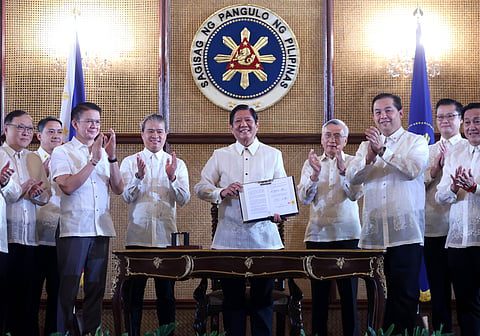
- NEWS
- the EDIT
- COMMENTARY
- BUSINESS
- LIFE
- SHOW
- ACTION
- GLOBAL GOALS
- SNAPS
- DYARYO TIRADA
- MORE

President Ferdinand “Bongbong” Marcos Jr. has signed on Thursday Republic Act 12063, or the Enterprise-Based Education and Training Framework Act, which aims to meet the requirements of the “rapidly changing world of work.”
According to Marcos, this will address job-skill mismatches, unemployment, underemployment, and other labor challenges.
“With the ceremonial signing of the Enterprise-Based Education and Training (EBET) Framework Act, we reaffirm our commitment to addressing the skills gap in our labor force and pledge to forge a more adaptable, future-ready workforce,” he said.
“Through this law, we renew our focus on our most important asset—our people,” he added.
With this, the government is opening up pathways, providing workers with accessible and relevant skills training, as well as professional growth, employment opportunities, and entrepreneurship.
“We are answering the call for quality employment and fostering a globally competitive workforce,” Marcos stressed.
Private-sector partnerships
The government is tapping into the private sector to fulfill these goals, as it will play a “crucial role” in ensuring the workforce is properly equipped with the right skills to meet the demands of the industry.
The EBET Framework also harmonizes various approaches such as apprenticeship, leadership, and the dual training system.
It will also target foundational and mid-level skills, providing participants with practical training that prepares them for immediate employment.
According to Marcos, training will last six months under EBET programs.
Government incentives
Fiscal incentives will be provided by the government to companies that implement EBET programs, including a deduction from their taxable income equivalent to 50 percent of actual training expenses.
Donations or financial aid for technical vocational institutions and the conduction of EBET programs, as certified by TESDA, are exempted from taxes and duties.
Micro and small enterprises (MSEs) will be supported by EBET support integrators who will guide businesses in analyzing market trends, designing training plans, and organizing necessary documentation.
For his part, Technical Education and Skills Development Authority (TESDA) Director General Jose Francisco Benitez expressed his appreciation for the President's support of the new measure.
Benitez added that TESDA asked Congress for additional funding of P4 billion in the 2025 budget, which aims to support at least 105,000 EBET scholars.
On Wednesday, the Philippine Statistics Authority released the latest Labor Force Survey, which indicated improved employment and unemployment rates in September.
Marcos said the EBET Act will help sustain the improved numbers.
